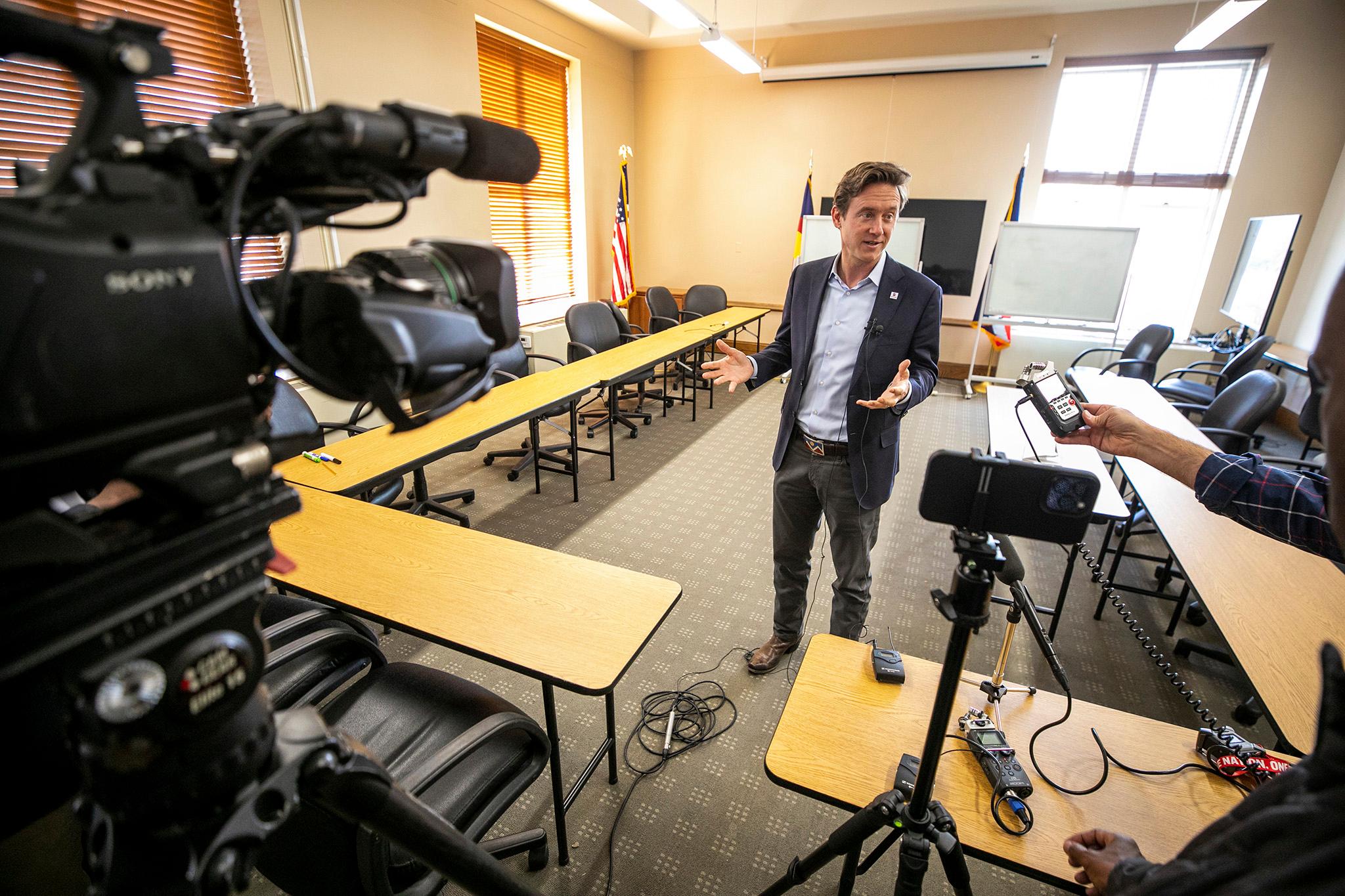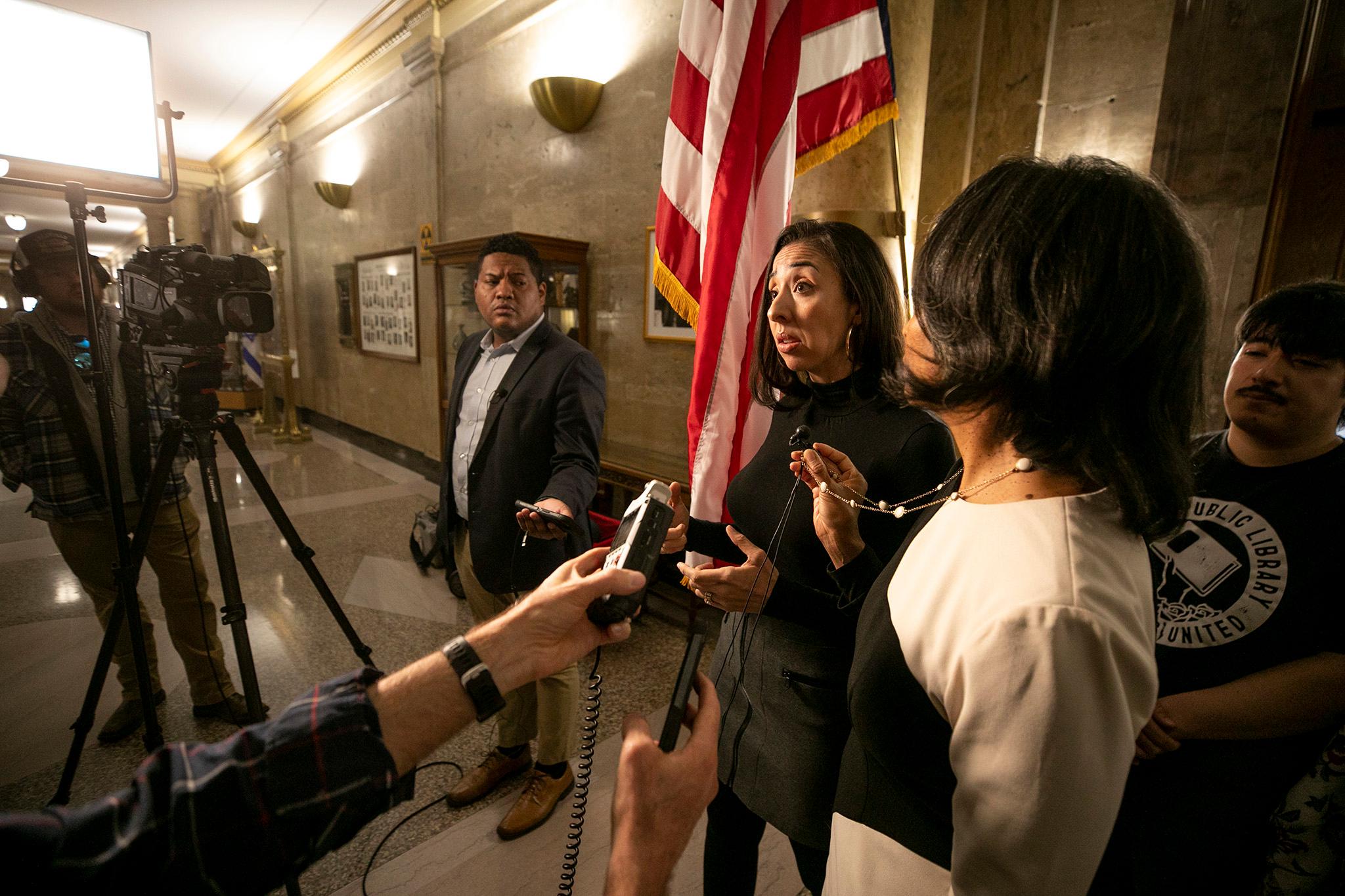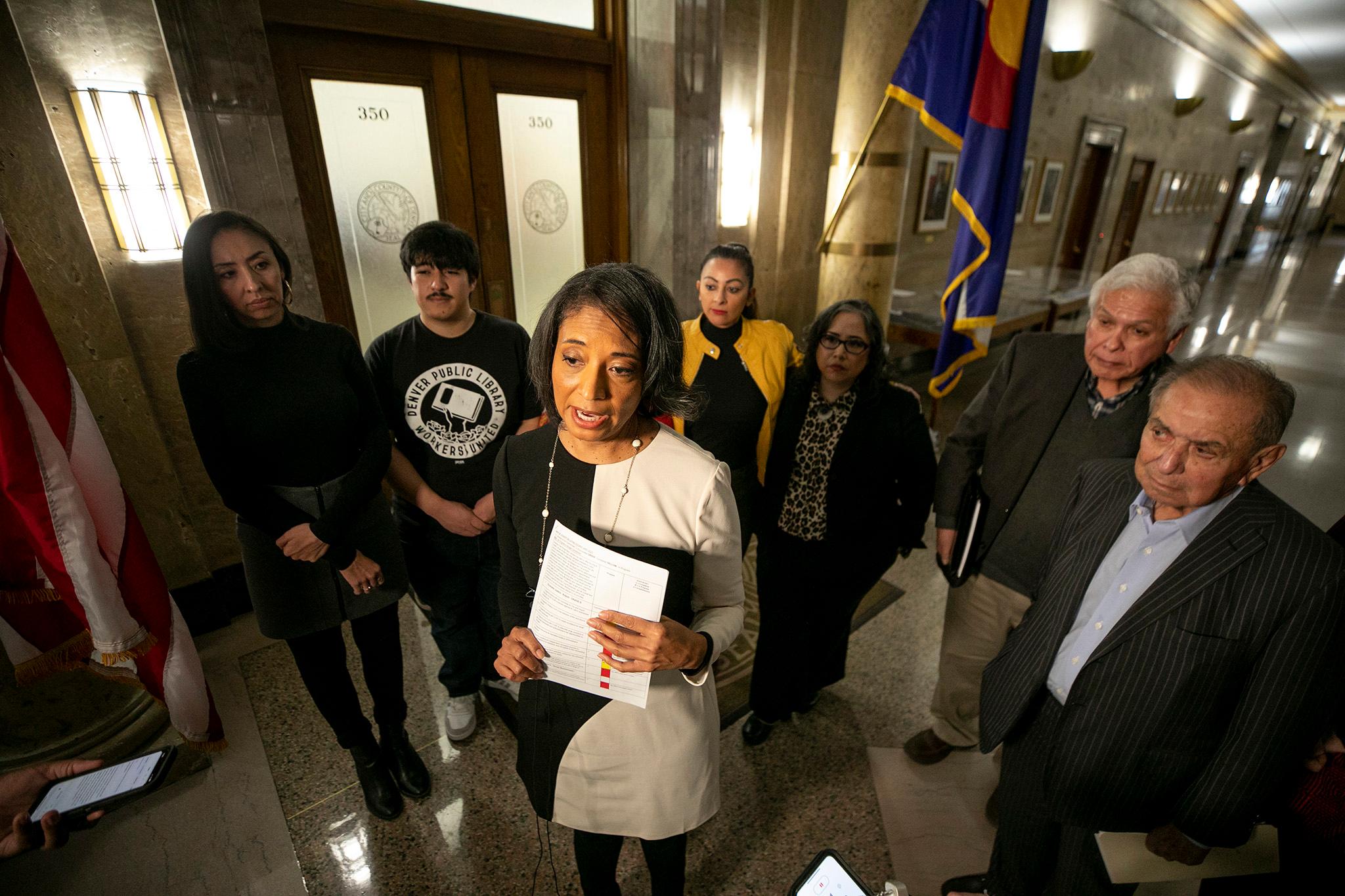Former campaign rival Lisa Calderón gave the man she endorsed, new Denver mayor Mike Johnston, low marks Wednesday for his first four months in office.
Calderón stood outside the office she'd hoped to occupy herself to deliver a D grade to Johnston. The score is based on a 79-point scorecard of ratings given across categories like economic justice, education equity, leadership culture, public safety, gentrification and displacement, and immigration.
"The point is we are looking for structural change, not just more meetings to have meetings," said Calderón, flanked by other community members from the group LUNA, Latinos United Neighbors Association, a grassroots community organization of Latino leaders. The group has 20-plus members and represents small business owners, immigrant advocates, labor leaders, medical professionals, community organizers, and educators.
Calderón said Johnston has failed to keep most campaign promises, missed chances to collaborate, and said one thing and then reversed course. She also criticized the new mayor for keeping in place key members of the leadership team from the Hancock administration and making political appointments without broad community input or transparency.
"We are largely seeing a lot of the same key players back in this administration," she said.
Latinos represent around 30% of this city's population, Calderón said, but are "very underrepresented" on boards and commissions and in leadership positions.
Johnston defended his administration and said he had a different perspective on the dozens of items on which the administration was rated.
"I'm happy to work with them in an ongoing way. But I always am open to taking feedback and then figuring out what we can do better," he said. "But we feel very good about the progress we're making and the progress ahead for the next, oh, three years and six months."

Johnston pushed back on the low marks while noting he and his team have set lofty goals, particularly regarding housing and homelessness.
"I give us a great grade on our progress to date. I think we're on a historic pace to do things that have never been done before," he said.
In May, after coming in third in the runoff, Calderón endorsed Johnston.
She had narrowly missed the final round with nearly 32,000 votes -- about 3,100 votes fewer than Kelly Brough, who claimed the second spot.
Both campaigns wanted her backing.
Johnston's early months have focused heavily on a much-debated effort to tackle the city's housing and homelessness crisis, the House 1000 Initiative, an ambitious multi-million dollar push to get 1,000 people into shelter by the end of this year.
But Calderón said the campaign hasn't yet moved the needle.
"House 1000 is not delivering," she said, noting the administration had been poaching staff from other departments to meet the goal. "So what we're really doing is it's a shell game to just shift people on the street out of sight, to make people feel safer even though they're not really safer."
"The amount of money that is being spent on temporary housing solutions instead of permanent housing solutions is of great concern," she said.
Calderón said she echoed the views voiced by Councilwoman Stacie Gilmore. Earlier this month Gilmore resigned as the chair of the council's Safety, Housing, Education & Homelessness Committee, frustrated by the administration's strategy and communication.
"It seems like there's a blank check being written for the House 1000 without a lot of accountability," Calderón said.
Johnston said he's listening while keeping his eyes on goals he acknowledges are ambitious. He also batted back the suggestion that he's focused too much on one issue to the exclusion of others.
"We are 120 days in," the mayor said. "I have big goals for the next four years, for the next eight years. Things like 25,000 permanently affordable units, things like housing a thousand in the next six months, or 2000 in the next two years. None of those are done in the first hundred days. So we view all of these as the beginning of a process."
"We've been off to a pretty fast pace here," he noted.
In another high-profile category, public safety, LUNA gave Johnston an F.
The group examined 13 points, including recruitment, hiring, and promoting more Latinos and women of color, restructuring the public safety department to be more accountable, supporting new leadership at all levels with community input, and eliminating cronyism in hiring and promotion. For each, the group gave a U grade, for unsatisfactory.
It criticized the administration for "reappointing the same men to public safety leadership positions" and reappointing Hancock officials. "Performative and disrespectful community process," one entry read.
In November, Johnston announced that he'd formally asked for two key safety officials, Denver Department of Safety Director Armando Saldate and Denver Police Chief Ron Thomas, to remain in their jobs.
"We need a new breath of fresh air in our public safety leadership," Calderón said. "You should not be reappointing the same good old boys who have been there just because you're comfortable with them."

The group gave the Johnson administration an IP, in progress, grade for supporting at least tripling the funding for the STAR program, which sends a mental health clinician and a paramedic to nonviolent emergencies in place of police, and expanding the contract beyond one community provider. LUNA's scorecard noted that while funding has increased, the city is still using the same provider, which has problems fulfilling large city contracts.
Johnston discussed the grades in an eight-minute session with reporters.
On public safety, he didn't address the broader critique that his administration has relied heavily on reappointments and left out Latinos.
"We've already come out with a historic expansion of not just officers for next year, but of actual non-office based responders like our STAR program and our non-responder programs. And we see those as connected," he said.
The mayor said the city is already working on unifying its 311 system (a hotline for city services), 911 system, and 10-digit non-emergency 911 system into two lines "that are more effective and more efficient." Improving those systems was not on the group's scorecard.
"I think many of these things we're already working on, and they are connected to our work around homelessness, but we view that as part of a broader priority," Johnston said.
Calderón said she expected the group would meet with administration officials again in the coming months.
"So far he's made those meeting commitments and we expect him to meet the next one," said Calderón. "And he's a former educator. He doesn't want to see low grades. And so hopefully this is an incentive for him to improve his grade."
The group said they looked at the scorecard as "homework assignments" and aimed to have regular meetings with his administration, not necessarily with the mayor himself every single time.
"What we expect is for the work to be broken down into chunks and for us to have a direct liaison working on each segment of our scorecard," said Candi CdeBaca, a former city council member.













